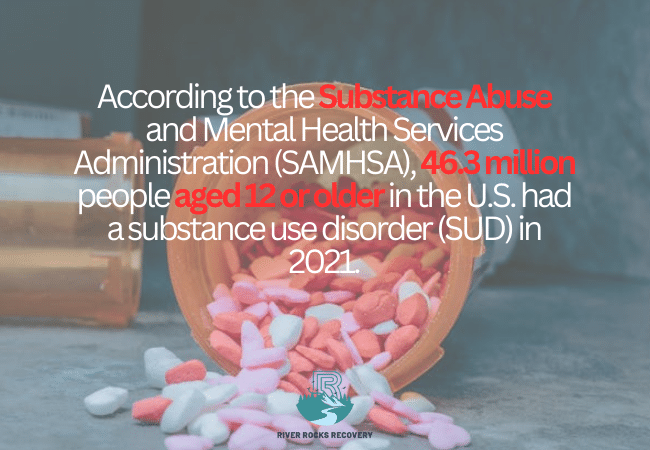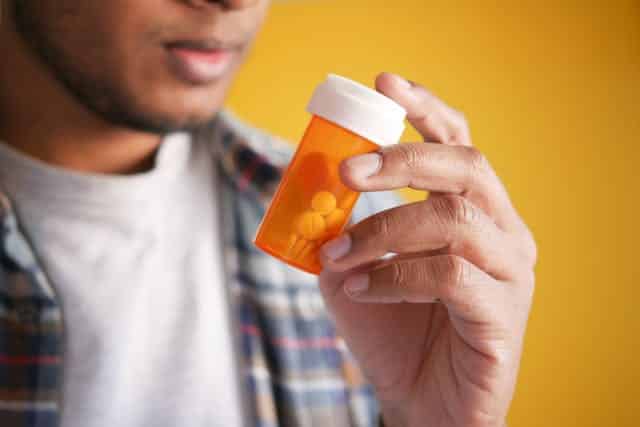Drug addiction is a complex and pervasive issue affecting millions of individuals and families in the United States. Some drugs carry an exceptionally high risk of abuse due to their ability to induce euphoria, quickly build dependency, and cause severe withdrawal symptoms. These substances can devastate lives, but recovery is possible with the right support.
At River Rocks Recovery, we provide compassionate and evidence-based care to help individuals overcome addiction to these high-risk drugs. Our comprehensive programs, such as the Addiction Treatment Program, Partial Hospitalization Program, and Sober Living Program, address the physical, emotional, and psychological aspects of addiction, paving the way for lasting recovery.
In this blog, we’ll examine the drugs with the highest potential for abuse, why they are so addictive, the consequences of misuse, and how professional treatment can help.
What Makes a Drug Highly Addictive?
Several factors contribute to a drug’s potential for abuse and addiction:
- Intense Euphoria: Substances that activate the brain’s reward system and produce feelings of intense pleasure or relaxation are more likely to be abused.
- Rapid Onset: Drugs that act quickly in the body provide an immediate high, which can reinforce the desire to use them repeatedly.
- Physical Dependence: Many addictive drugs cause physical changes in the body, leading to withdrawal symptoms when use is reduced or stopped.
- Psychological Dependence: These substances often create a mental reliance where individuals feel they cannot function without the drug.
- Availability: Drugs that are widely accessible, either legally or illegally, are more likely to be abused.
Drugs with the Highest Potential for Abuse
1. Opioids
- Examples: Prescription painkillers (OxyContin, Vicodin, Percocet), heroin, and fentanyl.
- Why They’re Abused: Opioids relieve pain and produce euphoria by interacting with opioid receptors in the brain. Prolonged use leads to tolerance, requiring higher doses to achieve the same effects.
- Risks:
- Overdose: Opioid overdose can suppress breathing and lead to death.
- Transition to Illicit Drugs: Many individuals addicted to prescription opioids turn to heroin or fentanyl.
- Health Issues: Long-term use can lead to organ damage, chronic constipation, and hormonal imbalances.
- Treatment Options: Opiate Rehab Treatment, medical detox, and therapy programs like Partial Hospitalization Program or Intensive Outpatient Program provide a comprehensive path to recovery.
2. Stimulants
- Examples: Cocaine, methamphetamine, and prescription stimulants (Adderall, Ritalin).
- Why They’re Abused: Stimulants increase energy, focus, and alertness by boosting dopamine levels in the brain. The resulting euphoric high often leads to repeated use.
- Risks:
- Cardiovascular Issues: High blood pressure, heart attacks, and strokes.
- Mental Health Problems: Paranoia, aggression, and severe mood swings.
- Addiction Cycle: Intense crashes following the high reinforce the need to use again.
- Treatment Options: Drug Rehab Treatment programs focus on breaking the addiction cycle and rebuilding physical and mental health.
3. Alcohol
- Why It’s Abused: Alcohol is widely available and socially accepted, making it one of the most commonly abused substances. It acts as a depressant, relaxing the mind and body, but also impairs judgment and coordination.
- Risks:
- Health Problems: Liver disease, heart issues, and alcohol poisoning.
- Addiction: Prolonged use can lead to dependency and withdrawal symptoms like tremors, seizures, and hallucinations.
- Behavioral Consequences: Increased risk of accidents, violence, and risky behaviors.
- Treatment Options: Programs like Sober Living Program and Outpatient Treatment Program help individuals achieve and maintain sobriety.
4. Benzodiazepines (Benzos)
- Examples: Xanax, Ativan, Valium, Klonopin.
- Why They’re Abused: Benzodiazepines are prescribed for anxiety and insomnia, providing a calming effect. However, their rapid action and addictive potential make them prone to misuse.
- Risks:
- Severe Dependence: Stopping abruptly can lead to life-threatening seizures.
- Memory Problems: Long-term use affects cognition and memory.
- Overdose: Risk increases when combined with other substances like alcohol.
- Treatment Options: Supervised detox in a Partial Hospitalization Program, followed by therapy to address the root causes of anxiety and addiction.
5. Synthetic Drugs
- Examples: Fentanyl (illicit), synthetic cannabinoids (Spice, K2), and synthetic stimulants (bath salts).
- Why They’re Abused: These substances mimic the effects of traditional drugs but often come with unpredictable and dangerous side effects.
- Risks:
- Unpredictable Reactions: Severe hallucinations, paranoia, and violent behaviors.
- Overdose: Especially with fentanyl, which is 50-100 times more potent than morphine.
- Health Complications: Damage to the heart, kidneys, and brain.
- Treatment Options: Holistic care through a Drug Rehab Treatment program to address the physical and psychological damage caused by synthetic drug abuse.
Consequences of Abusing High-Potential Drugs
Abusing drugs with a high potential for addiction, such as opioids, stimulants, alcohol, benzodiazepines, and synthetic substances, carries severe and far-reaching consequences. These drugs not only affect physical health but also take a toll on emotional well-being, relationships, and financial stability. Understanding the full scope of these consequences underscores the importance of seeking professional treatment through programs.
1. Physical Health Consequences
High-potential drugs cause significant damage to various organs and bodily systems, often leading to chronic health issues or fatal outcomes.
- Organ Damage:
- Opioids: Long-term use can damage the liver, kidneys, and digestive system.
- Alcohol: Chronic abuse leads to liver cirrhosis, heart disease, and weakened immunity.
- Stimulants: Cocaine and methamphetamine can cause cardiovascular problems, strokes, and brain damage.
- Overdose Risks:
Overdose is a major risk for drugs like opioids, benzodiazepines, and synthetic substances such as fentanyl. These overdoses often suppress breathing or heart function, resulting in death if not treated promptly. - Infectious Diseases:
Sharing needles to inject drugs like heroin or methamphetamine increases the risk of contracting HIV, hepatitis B, and hepatitis C. - Chronic Pain and Conditions:
Abusing stimulants or opioids can lead to conditions like chronic migraines, nerve damage, and gastrointestinal issues.
2. Emotional and Psychological Consequences
High-potential drugs alter brain chemistry, leading to mental health challenges that persist long after the drug is out of the system.
- Mental Health Disorders:
- Stimulants often cause paranoia, anxiety, or depression during and after use.
- Opioids and alcohol can exacerbate feelings of sadness, leading to long-term depressive episodes.
- Benzodiazepines impair memory and can contribute to emotional instability.
- Cognitive Impairment:
Prolonged drug use can reduce cognitive function, leading to memory loss, poor decision-making, and reduced problem-solving skills. - Emotional Instability:
Dependence on substances often leads to mood swings, impulsivity, and difficulty managing stress, which further strains personal and professional relationships.
3. Social and Relationship Strain
The ripple effects of addiction impact family members, friends, and communities.
- Erosion of Trust:
Deceptive behavior to hide drug use can lead to broken trust between loved ones. - Isolation:
Many individuals abusing drugs withdraw from their social circles, leading to loneliness and a lack of support. - Domestic Problems:
Substance abuse is a leading cause of conflict in families, often resulting in strained relationships, divorce, or custody battles. - Impact on Children:
Children in households affected by addiction may experience emotional neglect, developmental delays, and long-term trauma.
4. Legal and Financial Consequences
The financial and legal burdens of drug abuse can compound the stress of addiction.
- Legal Issues:
- Arrests for possession or distribution of illegal substances can lead to criminal records.
- DUIs (Driving Under the Influence) involving alcohol or drugs carry significant legal penalties, including jail time and fines.
- Financial Instability:
- The high cost of sustaining an addiction can deplete savings, lead to debt, and impact the ability to pay for basic needs.
- Job loss due to decreased performance, absenteeism, or workplace accidents is a common consequence.
- Property Loss:
Addictive behaviors often lead to foreclosure, eviction, or loss of valuable assets as individuals prioritize drug use over financial responsibilities.
5. Risk of Death
One of the gravest consequences of abusing high-potential drugs is the risk of fatal overdose.
- Opioids: Fentanyl and other synthetic opioids are responsible for a significant portion of the 107,000 overdose deaths reported in the U.S. in 2021.
- Stimulants: Cocaine and methamphetamine overdoses have increased dramatically in recent years, often due to contamination with fentanyl.
- Alcohol: Chronic alcohol abuse contributes to liver failure, heart disease, and alcohol poisoning, leading to approximately 140,000 deaths annually in the U.S.

How Professional Treatment at River Rocks Recovery Can Help
Overcoming addiction to high-risk drugs requires a tailored, multidisciplinary approach. At River Rocks Recovery, we provide personalized care to meet each individual’s unique needs:
1. Addiction Treatment Program
Our comprehensive program addresses the root causes of addiction, combining medical care, therapy, and skill-building to promote recovery.
2. Partial Hospitalization Program (PHP)
For individuals requiring intensive care, PHP provides structured treatment during the day with the flexibility to return home at night.
3. Intensive Outpatient Program (IOP)
Our IOP offers flexibility, allowing individuals to receive high-quality care while maintaining their work or family responsibilities.
4. Outpatient Treatment Program
This program focuses on relapse prevention and long-term recovery support, helping individuals maintain sobriety.
5. Sober Living Program
Our Sober Living Program provides a safe, supportive environment where individuals can rebuild their lives while staying accountable.
The consequences of abusing high-potential drugs are severe, but recovery is possible with the right support. At River Rocks Recovery, we offer evidence-based programs to address the physical, emotional, and social impacts of addiction.
- Medical Detox: Safely manage withdrawal symptoms under professional supervision.
- Therapy and Counseling: Address the root causes of addiction and rebuild emotional resilience.
- Family Support: Rebuild relationships and improve communication through family therapy.
- Relapse Prevention: Learn strategies to manage triggers and maintain long-term sobriety.
Take the First Step Toward Recovery
If you or a loved one is struggling with drugs with a high potential for abuse, know that recovery is possible. At River Rocks Recovery, we are dedicated to helping individuals break free from addiction and rebuild fulfilling lives.
Contact us today to learn more about our Addiction Treatment Program, Opiate Rehab Treatment, and other services. Together, we can help you achieve lasting recovery and a brighter future. Take the first step and contact us today at (888) 905-6281.
FAQ on Drugs with the Highest Potential for Abuse
What makes a drug highly addictive?
A drug is considered highly addictive if it produces intense euphoria, acts quickly in the body, creates physical and psychological dependence, and leads to severe withdrawal symptoms. Accessibility also plays a role, as widely available substances are more likely to be abused.
Which drugs are most commonly associated with high abuse potential?
The drugs with the highest potential for abuse include opioids (like oxycodone and heroin), stimulants (like cocaine and methamphetamine), alcohol, benzodiazepines (like Xanax and Valium), and synthetic drugs (like fentanyl and synthetic cannabinoids).
How can I recognize if someone is abusing a high-risk drug?
Signs of drug abuse include changes in behavior (secrecy, aggression, or withdrawal), physical symptoms (weight changes, lethargy, or hyperactivity), neglect of responsibilities, and withdrawal symptoms when not using the drug.
What are the risks of abusing drugs with high addiction potential?
Abusing these substances can lead to severe health complications, including organ damage, mental health issues, overdose, and death. Additionally, it often causes strained relationships, legal issues, and financial instability.
How can professional treatment help with recovery?
Professional treatment provides a structured approach to recovery, including medical detox, therapy, and support for long-term sobriety. Programs like Partial Hospitalization Program, Opiate Rehab Treatment, and Sober Living Program offer personalized care to address the physical, emotional, and psychological aspects of addiction.




























